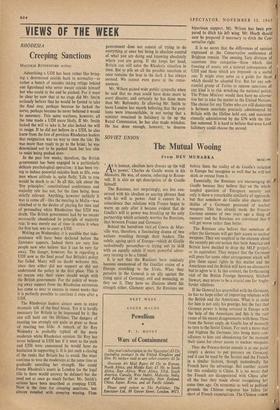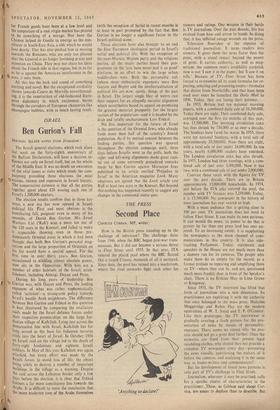SOVIET UNION
The Mutual Wooing
From DEV
Ais human, idealism here dresses up the will S to power,' Charles de Gaulle wrote in his Memoirs. He was, of course, referring to Roose- velt. It is also an apt description of de Gaulle himself.
The Russians, not surprisingly, are less con- cerned with his idealism or soaring phrases than with his will to power. And it cannot be a coincidence that relations with France began to warm up only after it became evident that de Gaulle's will to power was breaking up the only partnership which seriously worries the Russians, that between France and Germany.
Behind the humdrum visit of Couve de Mur- ville was, therefore, a fascinating drama of two nations wrestling through their leaders. The subtle, ageing spirit of Europe—which de Gaulle undoubtedly personifies—is trying out its skill with an equally subtle if more powerful adver- sary turning to be a friend.
It is not that the Russians have suddenly become enamoured of the Gaullist vision of a Europe stretching to the Urals. What they perceive in the General is an ally against the rising spirit of Germany, evil and menacing, as they see it. They have no illusions about his strength either. Glamour apart, the Russians see before them the reality of de Gaulle's isolation in Europe but recognise as well that he will not shirk or retreat from it.
Essentially, the Russians are encouraging de Gaulle because they believe that on the whole tangled question of European security not only is there a remarkable similarity of approach, but that somehow de Gaulle also shares their dislike of a Germany possessed of nuclear weapons. This has already made the Franco- German entente of two years ago a thing of memory and the Russians are convinced that it will get worse rather than better.
The Russians also believe that somehow or other the Germans will get their access to nuclear weapons. They are sceptical in the extreme about the recently put out notion that both America and Britain have decided to drop the MLF project, or its equivalent. They suspect that the Germans will press for some other arrangement which will give them equal rights in this matter and the Americans and the British will have no alternative but to agree to it. In this context, the forthcoming visit of the British Foreign Secretary, Michael Stewart, may prove to be a crucial one for Anglo- Soviet relations.
If the General has quarrelled with the Germans, he has no hope either of improving relations with the British and the Americans. What is at stake for him is not only his prestige, but the fact that German power is being restored in Europe with the help of the Americans and this is the root cause of his recent disagreements with them.Thus, from the Soviet angle, de Gaulle has of necessity to turn to the Soviet Union. For such a move may just frighten the Germans into being more con- ciliatory to him and abandoning for the moment their quest for closer access to nuclear weapons.
Thus the Franco-Soviet entente is at one point simply a device to put pressure on Germany and it can be used by the Soviets and the French in a similar fashion, though undoubtedly the French have the advantage. But another reason for this cordiality is China. It is no secret that the French are disappointed with China after all the fuss they made about recognising her some time ago. On economic as well as political grounds the Chinese response has fallen far short of French expectations. The Chinese orders for French goods have been at a low level and the temptation of a vast virgin market has proved to be something of a mirage. Nor have the Chinese helped de Gaulle to emerge as the con- ciliator in South-East Asia. a role which he would love dearly. This has also pushed him in moving towards the Russians, who are only too pleased that the General is no longer lavishing praise and attention on China. They may not share his ideas about the French role in that region, but in so far as he is against the American interference in the S area, it suits them.
All this has the look and sound of something exciting and novel. But the exceptional cordiality shown towards Couve de Murville notwithstand- ing, it is the resurrection of old-fashioned Euro- Pearl diplomacy in which excitement bursts through the corridors of European chanceries like champagne bubbles, with as much lasting result.















































 Previous page
Previous page